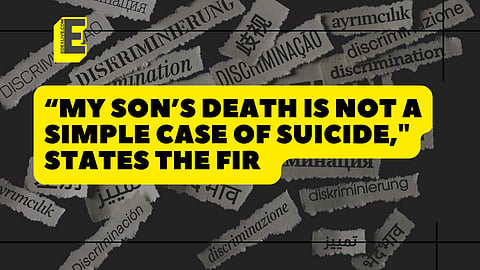

The Powai Police Station refused to register the First Information Report (FIR) filed by the family of Darshan Solanki, an 18-year-old Dalit student who died by suicide on the campus of the Indian Institute of Technology, Bombay (IIT-B). The family's letter accused the institution of perpetuating caste-based discrimination and suggested foul play in the death of Solanki. “Darshan suffered constant caste-based discrimination in the IIT Bombay campus, which the institute enabled to persist,” the FIR letter stated. According to the Ambedkar Periyar Phule Study Circle-IITB (APPSC-IITB), the police station denied the FIR because a Special Investigation Team (SIT) had already been established to investigate the matter, and they will only register an FIR if instructed to do so by the SIT. “They asked the family to go to the SIT and ask them if the FIR should be registered and denied to do so till there is an order from there,” informed APPSC-IITB.
To recall, Solanki’s death in February caused a stir in the country, reigniting discussion on institutionalised caste-based discrimination in elite institutions. Allegations were hurled at IIT-B and other similar institutes that it perpetuated and enabled discrimination of marginalised students on campus in order to protect “merit”. The APPSC-IITB had alleged that the death of Solanki was a case of “institutional murder”, while the institute maintained that the cause was deteriorating grades. The interim report from the investigation conducted by IIT-B also denied allegations of caste-based discrimination and instead pointed to Darshan Solanki's academic performance as a possible factor in his death. The report noted that Solanki struggled to maintain his academic performance based on his JEE ranks and scores, which is a criterion to often discriminate against marginalised students on campus.
The FIR report by the family also made similar allegations and stated, “I believe that my son’s death under suspicious circumstances is a murder committed at the hands of those individuals in the institute harassing and discriminating him on the basis of caste, and not a simple case of suicide.” The letter further mentions how the police refused to record the statements of the Solanki’s family members, thereby deliberately neglecting statements that could be counted as evidence of caste discrimination.
APPSC-IITB rejected the investigation report earlier this month, calling it the most "unscientific document from a 'scientific institution'" and alleging that it could be renamed a "signed confession of institutional murder of Darshan Solanki by committee. In a three-page document released last month, the APPSC-IITB also accused the institute of caste discrimination, lapses in administration, and challenges faced by reserved category students. Additionally, representatives from quite a few IITs, including IIT Madras, have been complaining for a while about a lack of proper SC/ST cells and grievance redressal mechanisms for marginalised students on campus. IITs have been frequently called out for their daily casteism based on names, English proficiency, JEE Scores, and rankings. APPSC-IITB previously said that the urban crowd usually makes the marginalised crowd feel alienated and anti-reservation sentiments on campus are commonplace with casteist slurs thrown at these students.
